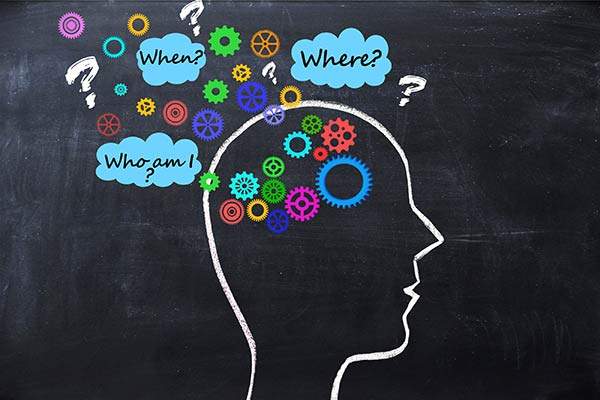Cognitive ignorance and selective memory

- 4126
- 1238
- Austin Stokes
Has it happened to you that you find someone who says to meet you but no matter how much you treat you? When you meet someone, cognitively make the decision regarding whether or not the individual has interest for you, When you do not find it like that, the process of cognitive ignorance can come in. There are other factors that could influence the apparent "forgetfulness", therefore, to catalog them as such, other criteria must be excluded, such as those of neurophysiological origin, since perception, and especially attention and memory are complex cognitive functions that tend To be selective.
Content
Toggle- The importance of the first impressions
- What other factors do other factors come into action with "cognitive ignorance"?
- Cognitive ignorance and selective memory
- Prejudices and stereotypes as psychosocial factors of cognitive ignorance
- Improve personal data recovery in 6 steps
- Conclusion
- Bibliographic reference
The importance of the first impressions
People are constantly making judgments about what surrounds us and the people we find in our way, this is a process that we mainly perform unconsciously, because We have a natural tendency to make assessments, this can help us distinguish certain characteristics in others, with which a classification is made. This process generally occurs unconsciously.
When we met a person we did not know before, it is said that we start from zero contact, if for different reasons we establish contact with it, at the beginning it is usually superficially and decides whether or not the person has any interest for us. If you have qualities that attract our attention or it is attractive in some sense, the safest thing is that we can remind you, otherwise the cognitive ignorance.
In the event that the person lacks interesting attributes in some sense for the other individual and does not stand out much among others, the subject can be "forgotten", or what is more precise: His memory will be stored but the recovery of the memory will be inaccessible, This process is known as: cognitive ignorance (Rodin, 1987).
What other factors do other factors come into action with "cognitive ignorance"?
The phenomenon of cognitive ignorance comes into play with the help of other processes such as: Attention and selective memory; Likewise, the cognitive biases, among which the halo effect stands out, Between other type of hierarchizations. Also, sociocultural factors such as prejudices and stereotypes, They collaborate with the aspect of the classification we make of people, these aspects influence the way of perceiving the reality that surrounds us; Cognitive ignorance is a subjective process, It depends on the particular context of each person.
 The 12 strangest mental hallucinations
The 12 strangest mental hallucinations Cognitive ignorance and selective memory
This is an issue that has been very interested in Cognitive Psychology. There are objects and people that may seem to "easily forget"; The cognitive process of the Memory, allows the brain to encode and store the information you capture, He is even able to keep memories of those who are not aware, so why can't you remember that person who seems to meet you?
Memory operates similar to a computer, has the ability to save large volumes of information, however, a classification system is required that allows identifying the location and "update" of the retained files to be able to use them at the time at the time right in which they are needed, this would correspond to Data recovery, a key phase of memory that allows access to all the information that is stored.

When the brain perceives that something lacks "relevance" filters the information and classifies it as such, and although it stores it, it keeps it in shape, which can sometimes prevent recovering or accessing that memory.
In the event that the difficulty of remembering the name of people often happens or you cannot identify very well where they know them, it is necessary to rule out physiological and neurological factors by which forgetting could have been generated, when the problems They are frequent, it is advisable that you go to a psychologist, who can give you Strategies to work on improving a process as important as memory, Mnemonic techniques can be some of them.
Prejudices and stereotypes as psychosocial factors of cognitive ignorance
Throughout development, People meet others and face situations that they often respond with typical behavior patterns, Cognitive ignorance can be one of them. Human beings tend to "label" people. Certain investigations have shown that positive affection derives in pleasure towards others, while negative affection leads to displeasure (Krosnick and Cols., 1992). Interpersonal attraction factors play an important role in this process.
The stigmata, are characteristics perceived negatively, As can result for some people: race, age, sex, religion, physical condition, sexual preference, among others, aspects with which they can elaborate a negative association for some reason.
"Although a stigma is transcended, the affection associated with the previous stigma is not necessarily dissipated.”Rodin & Price, 1995.
The Stereotypes, They have great influence on the perception of different aspects of our daily reality, when they lack flexibility, or they are too rigid, they can be excessively simple and limited to determine a person or a social group, many stereotypes are based on social stigmas and prejudices.
It is necessary to train new generations with a more inclusive and global culture, where prejudices and sociocultural stigmas are not a “wall” that divides people, that hate and violence between congeners are generated, but also represents an opportunity to add efforts aimed at achieving better results, through collaboration in causes prosocial, always under an area of respect for the rights of those who are different from ourselves.
"The behavior performed is an insignificant part of the possible behavior. The man, at every moment, is full of unrealized possibilities". Lev Semiionovich Vygotsky
Improve personal data recovery in 6 steps
- When you know someone try to put attention, since this process is also selective, Identify something characteristic in the person, so you can remember later.
- Associates the image of the person, A particular characteristic in it that you choose, as well as its name, link this with an object and a place, which can serve you as a reference, so that you can facilitate the subsequent recognition of the location of that “file” or memory. For example: if the person is called "Margarita", you might build the image of a margarita in a green meadow.
- Imagine a "mental screen" and enter that data, Visualizing This information in your mind, inside the screen you created.
- Avoid prejudices. Try that your classification and assignment of easy association factors be in an area of respect towards the particular characteristics of the person.
- Practice regularly. When doing this simple exercise, you can improve that aspect of your memory and remember the people with whom you have had even superficially contact, otherwise psychological assistance is recommended.
Conclusion
Cognitive ignorance intervenes with complex cognitive processes such as perception, attention and selective memory, in turn, is influenced by personal attraction factors, cognitive biases, psychosocial aspects such as prejudices and stereotypes. It is necessary to educate the new generations in an area of respect and tolerance, build and promote a more inclusive and global culture, which participates in prosocial causes.
Memory can improve through simple mnemonic techniques, when there is a more serious problem and “oblivion” is constant, it is advisable to visit a psychologist, who can help determine if this happens due to other causes that could affect health and the development of the person, otherwise can collaborate for the improvement of social and cognitive skills.
Bibliographic reference
- Paez, d., Fernádez, i. and cols. (2004). Social Psychology, Culture and Education. Madrid: Pearson Education editorral.
- « Fentanyl, drug or medicine, abuse and side effects
- The changes that occur in the brain after being a mother »

